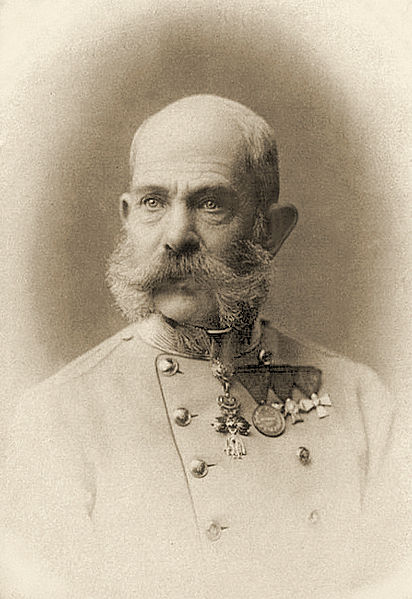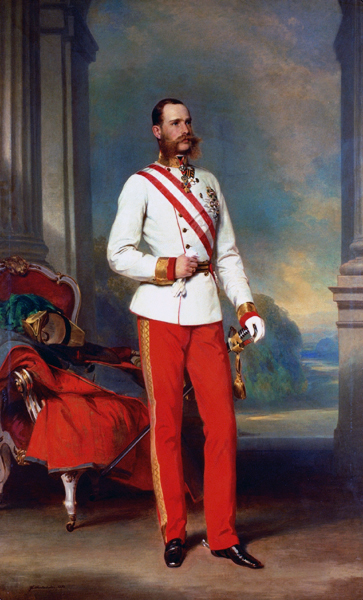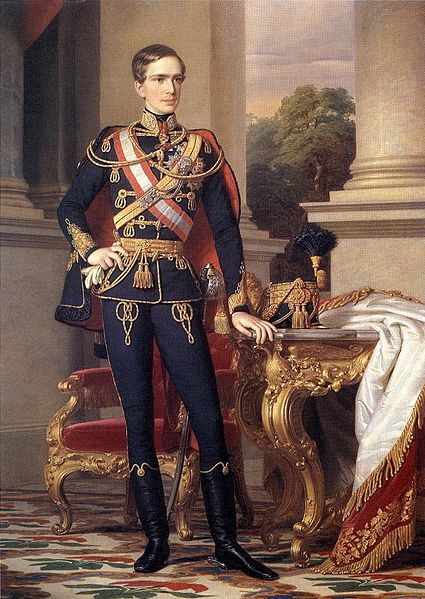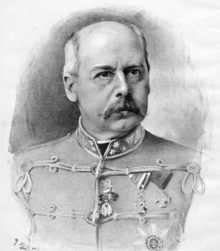<Back to Index>
- Emperor of Austria Franz Joseph I, 1830
- Minister of Foreign Affairs Gustav Siegmund Kálnoky, 1832
PAGE SPONSOR



Franz Joseph I or Francis Joseph I (German: Franz Joseph I., Hungarian: I. Ferenc József, 18 August 1830 – 21 November 1916) was Emperor of Austria, King of Bohemia, King of Croatia, Apostolic King of Hungary, King of Galicia and Lodomeria and Grand Duke of Cracow from 1848 until his death in 1916. From May 1, 1850 until August 24, 1866 he was President of the German Confederation.
In December of 1848, Emperor Ferdinand I of Austria abdicated the throne as part of Ministerpräsident Felix zu Schwarzenberg's plan to end the Revolutions of 1848 in Austria, which allowed Ferdinand's nephew Franz Joseph to ascend to the throne. Largely considered to be a reactionary, Franz Joseph spent his early reign resisting constitutionalism in his domains. The Austrian Empire was forced to cede most of its claim to Lombardy – Venetia to the Kingdom of Piedmont - Sardinia following the conclusion of the Second Italian War of Independence in 1859, and the Third Italian War of Independence in 1866. Although Franz Joseph ceded no territory to the Kingdom of Prussia after the Austrian defeat in the Austro - Prussian War, the Peace of Prague (23 August 1866) settled the German question in favor of Prussia, which prevented the unification of Germany under the House of Habsburg (Großdeutsche Lösung).
Franz Joseph was troubled by nationalism during his entire reign. He concluded the Ausgleich of 1867, which granted greater autonomy to Hungary, hence transforming the Austrian Empire into the Austro - Hungarian Empire under his Dual Monarchy. His domains were then ruled peacefully for the next 45 years, although Franz Joseph's personal life became increasingly tragic after the suicide of his son, the Crown Prince Rudolf in 1889, and the assassination of his wife, the Empress Elisabeth in 1898.
After the Austro - Prussian War, Austria - Hungary turned its attention to the Balkans, which was a hotspot of international tension due to conflicting interests with the Russian Empire. The Bosnian crisis was a result of Franz Joseph's annexation of Bosnia and Herzegovina in 1908, which had been occupied by his troops since the Congress of Berlin (1878). On 28 June 1914, the assassination of the heir to the Austro - Hungarian throne, the Archduke Franz Ferdinand, at the hands of Gavrilo Princip, a Serbian nationalist, resulted in Austria - Hungary's declaration of war against the Kingdom of Serbia, which was Russia's ally. This activated a system of alliances which resulted in World War I.
Franz Joseph died on 21 November 1916, after ruling his domains for almost 68 years. He was succeeded by his grand - nephew Karl.
Franz Joseph was born in the Schönbrunn Palace in Vienna, the oldest son of Archduke Franz Karl (the younger son of Holy Roman Emperor Francis II), and his wife Princess Sophie of Bavaria. Because his uncle, from 1835 the Emperor Ferdinand, was weak minded, and his father unambitious and retiring, the young Archduke "Franzl" was brought up by his mother as a future Emperor with emphasis on devotion, responsibility and diligence. Franzl came to idolize his grandfather, der Gute Kaiser Franz, who had died shortly before the former's fifth birthday, as the ideal monarch. At the age of 13, young Archduke Franz started a career as a colonel in the Austrian army. From that point onward, his fashion was dictated by army style and for the rest of his life he normally wore the uniform of a junior officer.
Franz Joseph was soon joined by three younger brothers: Archduke Ferdinand Maximilian (born 1832, the future Emperor Maximilian of Mexico); Archduke Karl Ludwig (born 1833), and Archduke Ludwig Viktor (born 1842), and a sister, Maria Anna (born 1835), who died at the age of four.
Following the resignation of the Chancellor Prince Metternich during the Revolutions of 1848, the young Archduke, who it was widely expected would soon succeed his uncle on the throne, was appointed Governor of Bohemia on 6 April, but never took up the post. Instead, Franz was sent to the front in Italy, joining Field Marshal Radetzky on campaign on 29 April, receiving his baptism of fire on 5 May at Santa Lucia.
By all accounts he handled his first military experience calmly and
with dignity. Around the same time, the Imperial Family was fleeing
revolutionary Vienna for the calmer setting of Innsbruck, in Tyrol.
Soon, the Archduke was called back from Italy, joining the rest of his
family at Innsbruck by mid June. It was at Innsbruck at this time that
Franz Joseph first met his cousin Elisabeth, his future bride, then a
girl of ten, but apparently the meeting made little impact.
Following victory over the Italians at Custoza in late July, the court felt safe to return to Vienna, and Franz Joseph traveled with them. But within a few months Vienna again appeared unsafe, and in September the court left again, this time for Olmütz in Moravia. By now, Alfred I, Prince of Windisch - Grätz, the influential military commander in Bohemia, was determined to see the young Archduke soon put onto the throne. It was thought that a new ruler would not be bound by the oaths to respect constitutional government to which Ferdinand had been forced to agree, and that it was necessary to find a young, energetic emperor to replace the kindly, but mentally unfit Emperor.
It
was thus at Olmütz on 2 December that, by the abdication of his
uncle Ferdinand and the renunciation of his father, the mild mannered
Franz Karl, Franz Joseph succeeded as Emperor of Austria. It was at this
time that he first became known by his second as well as his first
Christian name. The name "Franz Joseph" was chosen deliberately to bring
back memories of the new Emperor's great - granduncle, Emperor Joseph II, remembered as a modernizing reformer.
Under the guidance of the new prime minister Prince Schwarzenberg, the new emperor at first pursued a cautious course, granting a constitution in early 1849. At the same time, military campaigns were necessary against the Hungarians, who had rebelled against Habsburg central authority under the name of their ancient liberties. Franz Joseph was also almost immediately faced with a renewal of the fighting in Italy, with King Charles Albert of Sardinia taking advantage of setbacks in Hungary to resume the war in March 1849. Soon, though, the military tide began to turn in favor of Franz Joseph and the Austrian whitecoats. Almost immediately, Charles Albert was decisively beaten by Radetzky at Novara, and forced both to sue for peace and to abdicate his throne. In Hungary, the situation was more grave and Austrian defeat was quite possible. Franz Joseph, sensing a need to secure his right to rule sought help from Russia, requesting the intervention of Tsar Nicholas I, in order "to prevent the Hungarian insurrection developing into a European calamity." Russian troops entered Hungary in support of the Austrians and the revolution was crushed by late summer of 1849. With order now restored throughout the Empire, Franz Joseph felt free to go back on the constitutional concessions he had made, especially as the Austrian parliament, meeting at Kremsier, had behaved, in the young Emperor's view, abominably. The 1849 constitution was suspended, and a policy of absolutist centralism was established, guided by the Minister of the Interior, Alexander Bach.
The next few years saw the seeming recovery of Austria's position on the international scene following the near disasters of 1848 – 1849. Under Schwarzenberg's guidance, Austria was able to stymie Prussian scheming to create a new German Federation under Prussian leadership, excluding Austria. After Schwarzenberg's premature death in 1852, he could not be replaced by statesmen of equal stature, and the Emperor effectively took over himself as prime minister.
On 18 February 1853, the Emperor survived an assassination attempt by Hungarian nationalist János Libényi. The emperor was taking a stroll with one of his officers, Maximilian Karl Lamoral O'Donnell, on a city bastion,
when Libényi approached him. He immediately struck the emperor
from behind with a knife straight at the neck. Franz Joseph almost
always wore a uniform, which had a high collar that almost completely
enclosed the neck. The collar of the uniforms at that time was made out
of very sturdy material exactly to counter this kind of attack. Even
though the Emperor was wounded and bleeding, the collar saved his life.
Count O'Donnell (descendant of the Irish noble dynasty O'Donnell of Tyrconnell) struck Libényi down with his sabre. O'Donnell, hitherto only a Count by virtue of his Irish nobility, was thereafter made a Count of the Habsburg Empire,
conferred with the Commander's Cross of the Royal Order of Leopold, and
his customary O'Donnell arms were augmented by the initials and shield
of the ducal House of Austria, with additionally the double - headed eagle
of the Empire. These arms are emblazoned on the portico of no. 2
Mirabel Platz in Salzburg,
where O'Donnell built his residence thereafter. Another witness who
happened to be nearby, the butcher Joseph Ettenreich, quickly
overwhelmed Libényi. For his deed he was later elevated to
nobility by the Emperor and became Joseph von Ettenreich. Libényi was subsequently put on trial and condemned to death for attempted regicide. He was executed on the Simmeringer Heide. After this unsuccessful attack, the Emperor's brother Ferdinand Maximilian Joseph, later Emperor of Mexico, called upon Europe's royal families for donations to a new church on the site of the attack. The church was to be a votive offering for the survival of the Emperor. It is located on Ringstraße in the district of Alsergrund close to the University of Vienna, and is known as the Votivkirche.
It was generally felt in the court that the Emperor should marry and produce heirs as soon as possible. Various potential brides were considered: Princess Elisabeth of Modena, Princess Anna of Prussia and Princess Sidonia of Saxony. Although in public life the Emperor was the unquestioned director of affairs, in his private life his formidable mother still had a crucial influence. She wanted to strengthen the relationship between the Houses of Habsburg and Wittelsbach, and hoped to match Franz Joseph with her sister Ludovika's eldest daughter, Helene ("Nené"), four years the Emperor's junior. However, the Emperor became besotted with Nené's younger sister, Elisabeth ("Sisi"), a girl of sixteen, and insisted on marrying her instead. Sophie acquiesced, despite some misgivings about Sisi's appropriateness as an imperial consort, and the young couple were married on 24 April 1854 in St. Augustine's Church, Vienna.
Their married life was not happy. Sisi never really adapted herself to the court and always had disagreements with the Imperial Family; their first daughter Sophie died as an infant; and their only son, Crown Prince Rudolf, died, allegedly by suicide in 1889, in the infamous Mayerling Incident. The Empress was an inveterate traveler, horsewoman, and fashion maven who was rarely seen in Vienna. She was stabbed to death by an Italian anarchist in 1898; Franz Joseph never fully recovered from the loss. According to the future Empress - Consort Zita of Bourbon - Parma he usually told his relatives: "You'll never know how important she was to me" or, according to some sources, "You will never know how much I loved this woman." (although there is no definite proof he actually said this).
The 1850s witnessed several failures of Austrian external policy: the Crimean War and break up with Russia, and defeat in the Second Italian War of Independence. The setbacks continued in the 1860s with defeat in the Austro - Prussian War of 1866, which resulted in the Austro - Hungarian Compromise of 1867.
Political
difficulties in Austria mounted continuously through the late 1800s and
into the 20th century. But Franz Joseph remained immensely respected.
His patriarchal authority held the Empire together while the politicians
squabbled.
In 1885 Franz Joseph met Katharina Schratt, a leading actress of the Vienna stage, and she became his mistress. This relationship lasted the rest of his life, and was, to a certain degree, tolerated by Sisi. Franz Joseph built Villa Schratt in Bad Ischl for her, and also provided her with a small palace in Vienna.
After the death of Rudolf, the heir to the throne was his nephew Archduke Franz Ferdinand.
When Franz Ferdinand decided to marry a mere countess, Franz Joseph
opposed the marriage strenuously, and insisted that it must be morganatic; he did not even attend the wedding. After that, the two men disliked and distrusted each other.
In 1903, Franz Joseph's veto of Cardinal Rampolla's election to the papacy was transmitted to the conclave by Cardinal Jan Puzyna. It was the last use of such a veto, because new Pope Pius X provided penalties for such.
In 1914, Franz Ferdinand was assassinated in Sarajevo, leading to World War I. When he heard the news of the assassination, Franz Joseph said that "in this manner a superior power has restored that order which I unfortunately was unable to maintain."
Franz Joseph died in the Schönbrunn Palace in 1916, aged 86, in the middle of the war. He was succeeded by his grand - nephew Karl. But two years later, after defeat in World War I, the Austro - Hungarian Monarchy was dissolved.
His 68 year reign is the third longest in the recorded history of Europe (after those of Louis XIV of France and Johannes II, Prince of Liechtenstein).

Count Gustav Siegmund Kálnoky (Hungarian: gróf Kálnoky Gusztáv Zsigmond), Austro - Hungarian statesman, was born on December 29, 1832 in Letovice (Lettowitz), Moravia to an old Transylvanian family which had held countly rank in Hungary from the 17th century. After spending some years in a hussar regiment, in 1854 he entered the diplomatic service without giving up his connection with the army, in which he reached the rank of general in 1879. He was for the ten years (1860 – 1870) secretary of embassy at London, and then, after serving at Rome and Copenhagen, was in 1880 appointed ambassador at St. Petersburg. His success in Russia procured for him, on the death of Baron Heinrich Karl von Haymerle in 1881, the appointment of minister of foreign affairs for Austria - Hungary, a post which he held for fourteen years.
Essentially a diplomatist, he took little or no part in the vexed internal affairs of the Dual Monarchy, and he came little before the public except at the annual statement on foreign affairs before the Delegations. His management of the affairs of his department was, however, very successful; he confirmed and maintained the alliance with Germany, which had been formed by his predecessors, and co-operated with Bismarck in the arrangements by which Italy joined the alliance. Kálnoky's special influence was seen in the improvement of Austrian relations with Russia, following on the meeting of the three emperors in September 1884 at Skierniewice, at which he was present. His Russophile policy caused some adverse criticism in Hungary. His friendliness for Russia did not, however, prevent him from strengthening the position of Austria as against Russia in the Balkan Peninsula by the establishment later of a closer political and commercial understanding with Serbia and Romania.
In 1885 he interfered after the battle of Slivnitsa to arrest the advance of the Bulgarians on Belgrade, but he lost influence in Serbia after the abdication of King Milan.
Though he kept aloof from the Clerical party, Kálnoky was a strong Catholic; and his sympathy for the difficulties of the Church caused adverse comment in Italy, when, in 1891, he stated in a speech before the Delegations that the question of the position of the Pope was still unsettled. He subsequently explained that by this he did not refer to the Roman question, which was permanently settled, but to the possibility of the Pope leaving Rome.
The jealousy felt in Hungary against the Ultramontanes led to his fall. In 1895 a case of clerical interference in the internal affairs of Hungary by the nuncio Antonio Agliardi aroused a strong protest in the Hungarian parliament, and consequent differences between Dezső Bánffy, the Hungarian minister, and the minister for foreign affairs led to Kálnoky's resignation.
He died in 1898 at Brodek u Prostějova (Prödlitz).